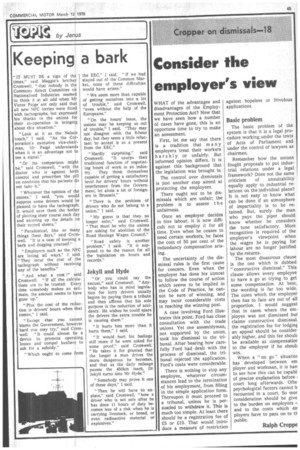'Keeping a bark
Page 67

If you've noticed an error in this article please click here to report it so we can fix it.
" IT MUST BE a sign of th times," said Maggie's brcthe Cromwell, "that nobody in th Commons Select Committee o Nationalised Industries seeme to think it at all odd when Victor Paige not only said th 4t all new NFC lorries were fitte with tachographs, but express his thanks to the unions f r their co-operation in bringing about this situation."
"Look at it as the Nels n touch," I said. "As the C poration's executive vice-chai man, Mr Paige understands when it is an advantage not to see a signal."
"Or the comparison might be," said Cromwell, "with the doctor who is against binth control and prescribes the pill on condition that his patients do not take it,"
" Whatever the opinion of the unions," I said, "you wotdd suppose some drivers would be pleased to have the tachograph. It would save them the bother of plotting their course each day and entering up the details on their record sheets."
"Paradoxical, like so many things these days," said Cremwell, "It is a case of keeping a bark and dogging yourself."
s i "Employers such as the IC are losing all ways," I d. "They incur the cost of the tachograph without receiving any of the benefits."
"And what a cost !" Said Cromwell. "If all the calcUlations are to be trusted, Eyery time somebody makes an estimate, the amount seems to have gone up."
"Plus the cost of the reduction in drivers' hours when that comes," I said.
"Except that you cannot blame the Government, however hard you may try," said Cromwell. " It could almost be a device to promote oper ting losses and compel haulier to ask for a subsidy."
"Which ought to come from the EEC," I said. "If we had stayed out of the Common Market, none of these difficulties would have arisen."
"We seem more than capable of getting ourselves into a lot of trouble," said Cromwell, "even without the help of the Europeans."
"On the hours' issue, the unions may be keeping us out of trouble," I said. "They may not disagree with the 8-hour day, but they seem a little reluctant to accept it as a present from the EEC."
"Hardly surprising," said Cromwell. "It usurps their traditional function of negotiating hours of work in an industry. They think themselves capable of getting a satisfactory level for drivers' hours without interference from the Government, let alone a lot of foreigners in Brussels."
"There is the problem of drivers who do not belong to a union," I said.
"My guess is that they no longer exist," said Cromwell. "That must be why the unions are asking for abolition of the Road Haulage Wages Council."
"Road safety is another problem," I said. "It is supposed to be the reason for all the legislation on hours and records."
Jekyll and Hyde
"Or you could say the excuse," said Cromwell. "Anybody who has in mind legislation for lorry drivers usually begins by paying them a tribute and then affirms that his sole purpose is the reduction of accidents. He wishes he could spare the drivers the extra trouble he is causing them."
"It hurts him more than it hurts them," I said.
"It would hurt his feelings still more if he were asked for some proof," said Cromwell. "He takes it for granted that the longer a man drives the more dangerous he becomes, and that as the daily mileage passes the 450km mark, Dr Jekyll turns into Mr Hyde."
"Somebody may prove it one of these days," I said.
"Then he will have to explain," said Cromwell, "how a driver who is not safe after he has done II hours of duty becomes less of a risk when he is carrying livestock, or bread, or even radioactive material or explosives."
















































































































